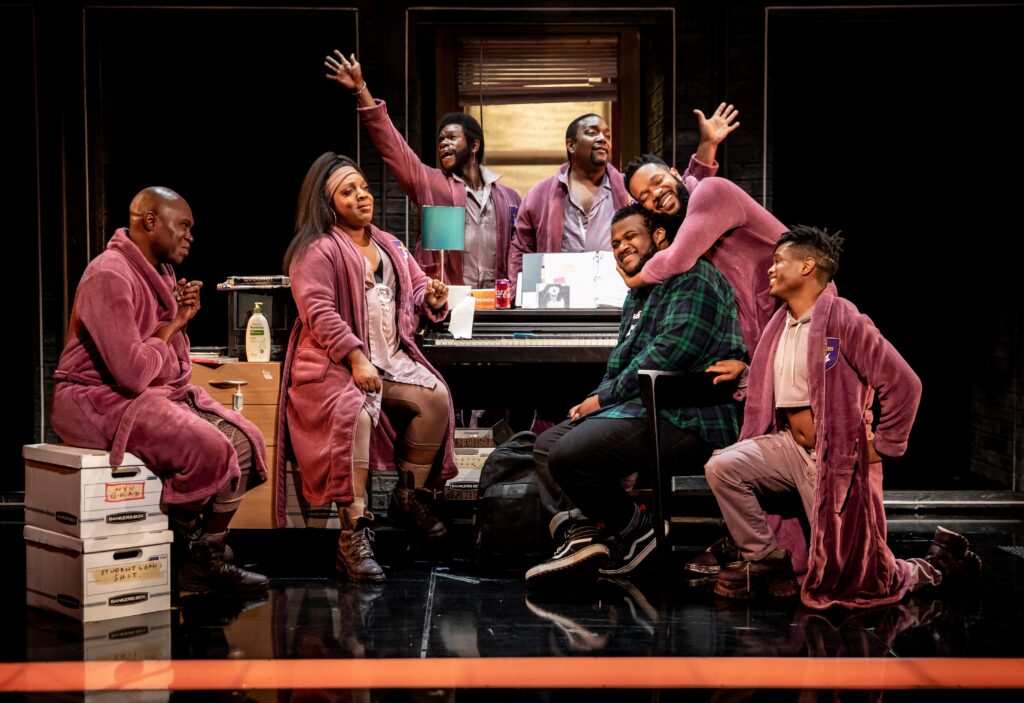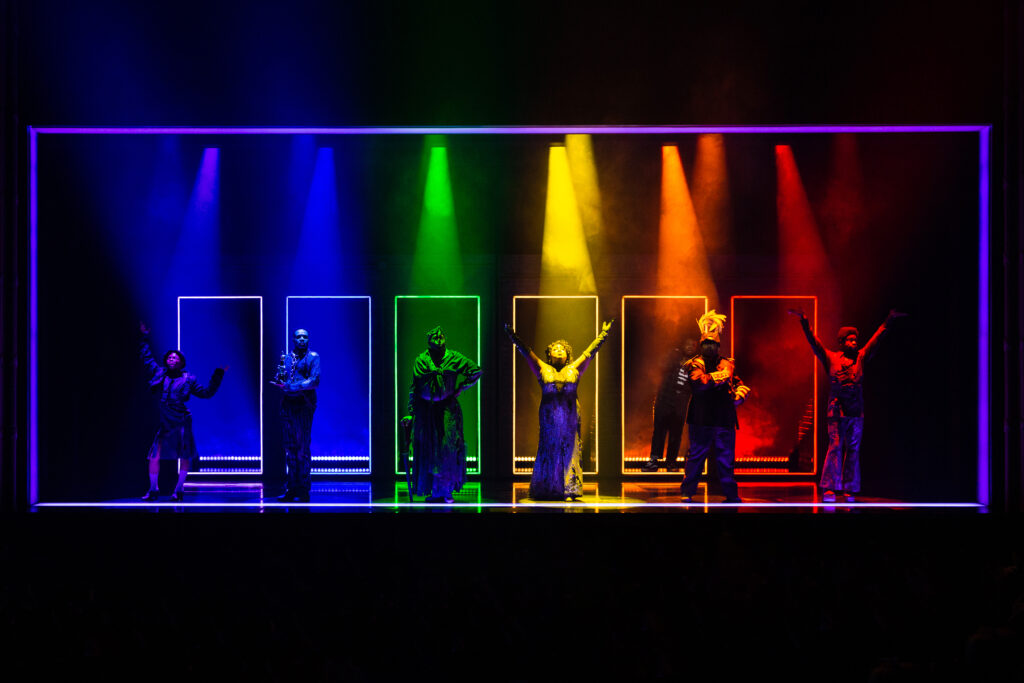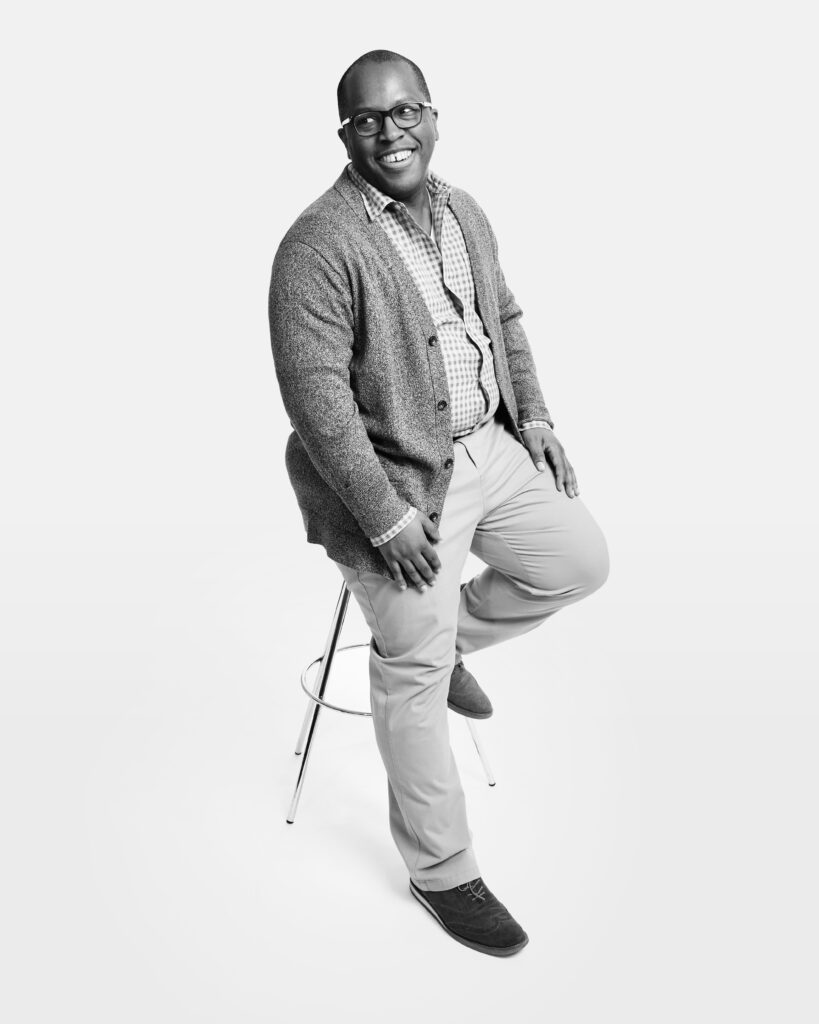Michael R. Jackson is the author and composer of A Strange Loop, the hit Broadway show that I have not stopped thinking about. I left the play, stumbling onto a hot Avenue, bewildered, tickled, and ruminant. The play’s writing had a mastery to it, a hard rhythm that was still pulsing in my heart, and running down into my shoes. I mean, fuck Beckett, this is what I want to see when I venture into a dark theatre in Times Square in the bleeting heat.
Not only does his name sort of make you do a little double take, Jackson is also in on the irony (or is it a loop?) — his website name and Instagram handle is “thelivingmichaeljackson.”
A perfect jibe you may call it. And more for the pensive mind. His work aims to turn a mirror to face yourself, to allow space for the person experiencing his magic to hopefully start looking at themselves, thinking about themselves — their opinions, beliefs, ideas about the world…and that’s where this play squirts into your eyes. In the brief second that you’re blinded by what you’re seeing on stage, your mind perhaps has never seen so clearly…
The play is the narrative of a gay black Broadway usher writing a musical about a gay black Broadway usher. The play not only won the 2022 Tony Award for best book of a musical, but also the Tony for Best Musical, plus the 2020 Pulitzer for drama. All inspired by a time when Jackson worked as — yes —- an usher at The Lion King on Broadway.

The play takes gayness, queerness, blackness and reveals some truths about it all –- some harder to swallow. The small cast of six supporting actors (personified as Greek-chorus-like “Thoughts”) share the stage with Usher (as in theater usher, not the musician) — our narrator, played by the actor Jaquel Spivey, “a fat American Black gay man of high intelligence, low self-image and deep feelings”, giving voice to his conscious and subconscious mind ziggles.
And at some point in the play the actors present themselves as Harriet Tubman, Jimmy Baldwin, Whitney Houston, Marcus Garvey, Zora Neale Hurston and 12 Years A Slave, all accusing Usher of being a race traitor. And right there, a loop is created.
The show’s title refers to a theory in cognitive science about the development of a sense of self — from the work of Douglas Hofstadter, a scholar of cognitive science and comparative literature. In his 1979 book Gödel, Escher, Bach: An Eternal Golden Braid, Hofstadter coined the term “a strange loop” to describe the recursive nature of selfhood and intelligence. But, as Usher confesses in the show, maybe it’s just a reference to a 1990s Liz Phair track he adores.
Michael R. Jackson grew up very middle class in Detroit, but moved to New York and consequently holds a BFA and MFA in playwriting and musical theater writing from the NYU Tisch School of the Arts. He has now written the book, music, and lyrics for a show coming in early 2023, White Girl in Danger, about a black soap opera character who lives in a soap opera town and who wants to be in a white storyline. I mean, loops are evidently just what makes him tick. And guess what, it has not stopped making me click-clack either. It’s hitting a nerve in a moment where sexuality, race and “what is real” are converging in ways that social scientists — decades from now — will write books and college courses about.
People think it’s all overnight success. But it never is. So, do you feel changed with all this well-deserved attention?
The word change is used in the show so much. In some ways I feel exactly the way I did when I started the show. I am obviously 41 now, and I was 23 then. I feel like the same person but maybe I am able to enjoy the moment more than if I was 23, if it happened then. But I definitely feel this as I transition into my next piece.
I know you’re working on something new. Tell me more.
I feel excited about it but also terrified. Which probably means I am doing the right thing. I keep telling people who’ve seen my current show to please hold on to any goodwill and please to bring it to my next thing, because it’s a different kind of show in a lot of ways. White Girl In Danger is a riff on my childhood love of soap operas and Lifetime Original movies. But it’s also a meditation on representation and these conversations around equity, diversity and inclusion. And I have been thinking about it in so many complicated ways.

Why is this complicated for you?
I think that sometimes these conversations can be a little flattening. Certainly as a black writer, when I sit down to write my canvas is very expansive. But for me, it always needs to be more than just putting a black person where there used to be a white person, or can we put a woman where there used to be a man.
Has the current woke culture put us on a backfoot to expanding the conversation in some ways?
I feel ironically, in a lot of these pushes of “diversity” it feels much more narrow. I will see these representations of what people call “diverse” but they feel untruthful. So what are we trying to demonstrate here by treating people like objects that can be moved around on a chessboard? White Girl In Danger is to take the premise of all these things and push it to its furthest conclusion –- and just to see what happens. If the answer to the problems of representation is just to switch everyone around, then I am experimenting with what happens when you do that.
Is our first black Vice President, Kamala Harris, an example of this kind of complicated position?
She’s a powerful black woman, yes. But who does she actually even speak for? She speaks for the state, and not for individual black women. Nor does she even necessarily speak for black constituent groups. Depending on what their class level might be. And that is another thing that White Girl In Danger gets into –- so many of these kinds of conversations are so class based, in ways that we’re not even talking about. But it has massive implications.
Can we talk about the N-word? It comes up a number of times in A Strange Loop.
I am never going to be prescriptive about that kind of thing. All I did in Strange Loop is reflect things from Usher’s perspective and in the stories he’s creating within the loop. The word is just a true expression of what’s in his history, what’s in his language. It’s just there, it’s just present. I am not telling anyone what to think about it, it’s just the truth of life. And it’s used very purposely and directly by the ancestors to him as a way of gauging him and getting him together when he dares to speak up. It’s also a word he uses to his father as a way to get his attention, he speaks very nakedly about his feelings.
For him, it’s a word that has a lot of power and he uses it to great effect.

You call this a truth. And you know what truth does to people.
Yes, it’s just the truth. And if the truth makes you uncomfortable, then it makes you uncomfortable. And that is what Usher and I want to get at, especially at the theater where we are often sidestepping the truth when to me the thing that is most powerful about the theater is that it can be a mirror, or a window. When talking to the audience afterwards, some people felt “seen” by the show, whereas some felt that they’ve seen something truthful with aspects that they can grab hold of. And it’s because Usher has no filter here, he speaks as he would speak and says it like he means it.
The idea of “black-enough” and “gay-enough” comes up in Strange Loop.
Like most things it’s completely subjective. It’s one of the many loops in the show, it’s just an illusion. But just because it’s an illusion doesn’t mean it’s not real, or doesn’t feel real.
Personally, something I have struggled with my whole life –- the notion of what is authentically black has been presented to me as a child in a number of forms, and these forms have also changed certainly in the last decade. As I am getting older, and being more comfortable in who I am and what I stand for, the idea of what is “black-enough” is now often comical to me, even as it takes hold in popular culture and politics. In the show, I am just playing with this: does the viewer think Usher is “super-black” or is he a sellout? As Usher says in the end, it’s all just an illusion.
Is everything just political?
I think the very fact that everything is political, it has made me feel less ideological than ever. And almost small L libertarian. I feel like I have been pushed into this corner, and this posture. Because I don’t understand a world where everything is political. And because politics is ultimately about power and battling for domination, and I am not interested in that. I am for Big Peace. I am for conflict resolution. I want to live in a world where we can work things out, and compromise where needed and a place where people feel they are supported. But I think we’re moving more towards WW3 at all times in every respect. In my own life I am trying to retreat from the war.
Does the world feel silencing in a way?
It’s self-silencing. I used to speak up more. I was constantly weighing my opinions on everything. Because I’ve been on social media for such a long time I can go back, and I can see things I’ve said. And there are things I have posted that I find cringe-worthy now. I have changed my mind over so many issues, so much over the years. And I have to give myself the grace to accept that — that I have changed. A lot of people have been, as I have, so inspired to see Joni Mitchell sing recently, and her lyric from the song “Both Sides Now” feels so apt to me:
Oh, but now old friends they’re acting strange
And they shake their heads and they tell me that I’ve changed
It’s all a strange loop. Is it better to change or not to change? Or is it all the same? We’re in the age of anti-reason. All I can do is put one foot in front of the other and sort out all my own thoughts. Which means I am often at the odds of the groups I belong to – it’s scary and lonely, but it feels necessary.
I also want to know how your life is right now. Like, how’s dating?
Dating is not happening. I am fully a career gal now. I have signed up for all these apps, but my DMs are empty.

Leave a comment